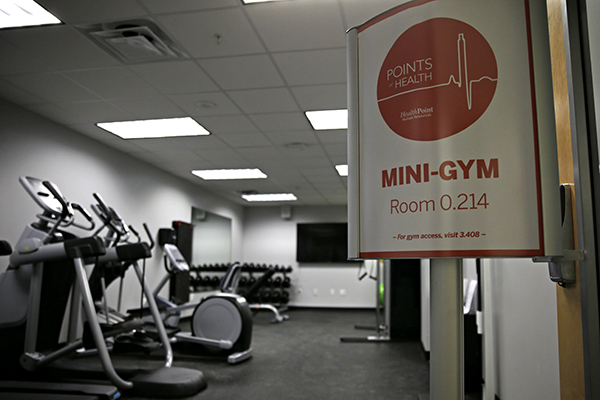Several new health initiatives targeting University employees are becoming available this academic year, including the first mini-gym and a pilot program for colon cancer screenings.
The mini-gym, which opened in November at the University Administration building, is part of a project created by UT’s Human Resource program HealthPoint Wellness, which hosts unstaffed “Points of Health” across campus and at off campus facilities. The Points of Health include the mini-gym, which requires a code, and stand-alone blood pressure machines, elliptical machines and weight scales.
Nosse Ovienmhada, the Work-Life Wellness manager, said these initiatives are meant to help employees better integrate healthy practices at work.
“Wellness programs have the potential to lower health care costs, increase productivity, decrease absenteeism and raise employee morale,” Ovienmhada said in an email. “Because employees spend a large portion of their waking hours at work, the workplace is an ideal setting to address health and wellness issues, benefiting your employees’ personal lives as well as their professional lives.”
Ovienmhada said 300 employees have signed up for access to the gym. This amounts to 8.5 percent of the total teaching faculty, according to UT’s Institutional Reporting, Research and Information Systems’ 2018 data.
Population health professor Edward Bernacki, who is also the executive director for WorkLife Health Solutions at UT Health Austin, the clinical practice of Dell Medical School, said the clinic is working on other health initiatives for UT System employees focusing on mental health and colon cancer. He said a colon cancer screening pilot program will debut this semester with a soft launch that will screen about 50 UT Austin employees this month.
“We found that the colon cancer screening rates for people (age) 50 and above are significantly lower than the national average, and we’re trying to get it up into 85–90 percent where we can save roughly five to 10 lives a year amongst all our employees,” Bernacki said.
Employees who qualify for any of these health initiatives are those who receive a paycheck from the University and are insured by a UT Select health insurance plan, Ovienmhada said.
Bernacki said companies that offer exciting exercise programs are “tremendously” benefiting employees. He said people are more inclined to exercise in a group and will increase productivity through exercise, based on research he conducted.
“What we found with individuals who are regular exercisers versus employees in a population who did not exercise (was) that the productivity of the individuals who exercised was significantly greater,” Bernacki said. “People who are inclined to exercise are higher performers, and once they engage in exercise, they were even higher performers.”
Kendall Dunn, a biology and Plan II freshman who runs and lifts weights when she feels stressed, said she thinks it is important for University employees to have a separate space to release stress and “blow off steam.”
“There can be a lot of pressure in a normal gym, especially a college gym, to be one of the fit people,” Dunn said. “Exercise for an employee who is on their feet all the time is very important because when working with customers (or students), it’s ideal to have less stress and less negative energy inside.”




















